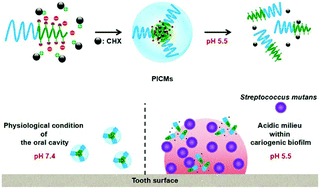pH-Responsive polymeric nanocarriers for efficient killing of cariogenic bacteria in biofilms†
Abstract
Traditional antibacterial treatments, such as chlorhexidine (CHX), destroy cariogenic biofilms. However, they exert negative effects in clinical applications, for example, teeth staining, taste disturbance and harm to oral tissue after a long-term exposure. Therefore, biocompatible strategies for efficient antibacterial drug delivery are in high demand. In this study, aimed at dental caries therapy enhancement, we designed a pH-responsive nanocarrier system, capable of releasing CHX in an acidic environment within cariogenic biofilms. Cationic poly(ethylene glycol)-block-poly(2-(((2-aminoethyl)carbamoyl)oxy)ethyl methacrylate) (PEG-b-PAECOEMA) was synthesized first. Modification of PAECOEMA by citraconic anhydride (CA) forms negatively charged PEG-b-PAECOEMA/CA, which could assemble into core–shell polyionic complex micelles (PICMs) when mixed with cationic CHX via electrostatic interactions. PICMs are stable in healthy neutral oral microenvironments with CHX encapsulated in the core and PEG shell exposed. Once in acidic milieu within caries-producing biofilms, they rapidly disassemble and release CHX cargo owing to degradation of citraconic amide groups. Molecular structures of the above copolymers were confirmed using 1H NMR and gel permeation chromatography (GPC) analysis. The pH-dependent degradation rates of citraconic amide in PEG-b-PAECOEMA/CA copolymer were measured by fluorescamine method. Atomic force microscopy (AFM) studies confirmed successful assembly of well-defined spherical PICMs in aqueous solution. The disassembly of PICMs in acidic microenvironment was observed using dynamic light scattering (DLS). PICMs showed an obvious pH-dependent drug release profile when the pH changed from 7.4 to 5.5. More importantly, the micellar system could reduce drug toxicity of CHX and exhibited outstanding antibacterial capability in the biofilm of Streptococcus mutans. Micelles constructed from pH-sensitive PEG-b-PAECOEMA/CA are highly promising for dental caries therapy and provide guidelines for drug-delivery system design in other acidic pathologic systems.



 Please wait while we load your content...
Please wait while we load your content...